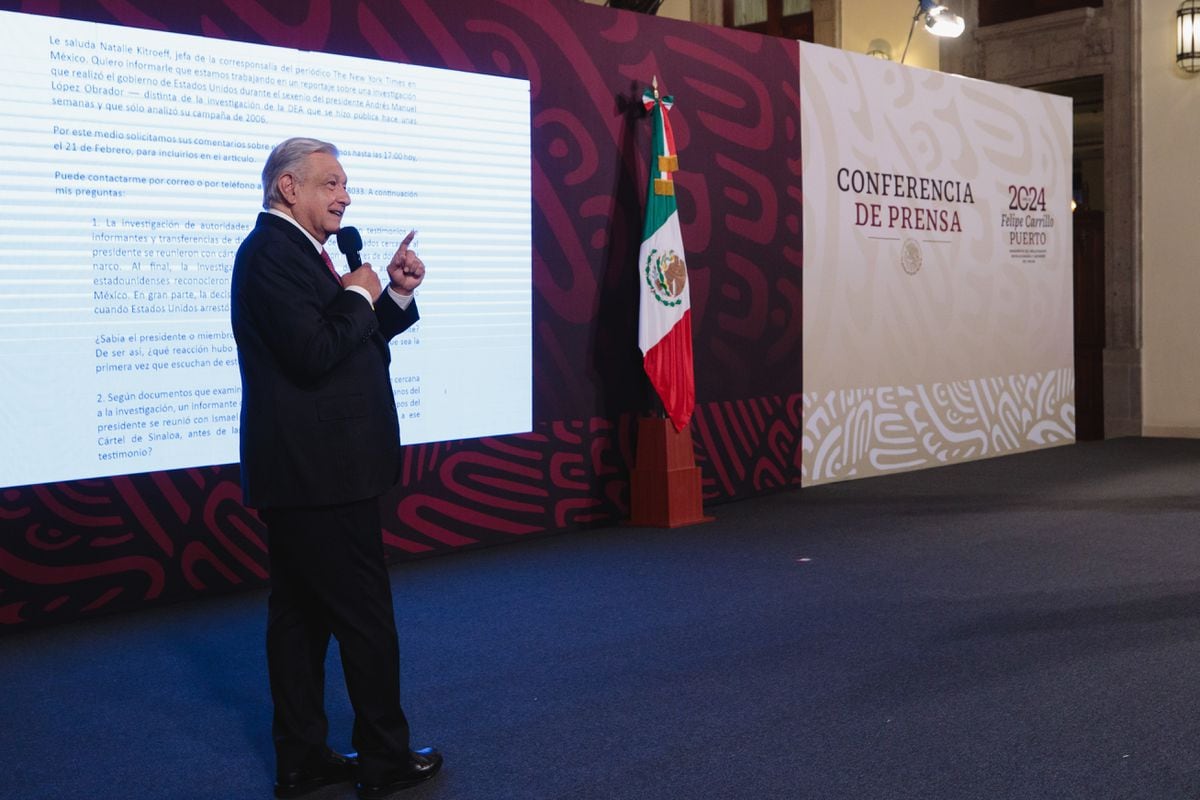President Andrés Manuel López Obrador's obsession with control of Mexico's energy resources has brought him to the brink of death.
He himself has confessed it.
In December 2013, when he was beginning to found the Movimiento Regeneración Nacional (Morena) party, he was admitted to a hospital south of Mexico City due to an “acute heart attack” while organizing a protest outside the Mexican Congress against the energy reform of the Government of former President Enrique Peña Nieto that opened the door to private companies.
This is how the purchase of power plants from the Spanish Iberdrola by the Government of Mexico represents another step, perhaps the most pronounced, on a path taken years ago, which fulfills Morena's raison d'être.
Since its founding, the party has sought to make the state the only important player in the energy sector, and while it is not really a nationalization as the president called it, it is a victory for his political project.
López Obrador's desire for energy resources goes through his admiration for former President Lázaro Cárdenas, who in 1938 expropriated the foreign companies that at that time controlled the country's oil industry.
Consulted by this newspaper, Gonzalo Monroy, a consultant specializing in energy, affirms that the purchase of assets from Iberdrola is not a nationalization, since the Mexican State did not acquire ownership of any of the plants.
The CFE will be the operator, but not the owner.
"It is not a nationalization, but it is a victory for the president," he considered.
Since the beginning of his administration, the president has used any mechanism, tool or legal loophole at his disposal to strengthen state companies dedicated to the exploitation of energy resources such as Petróleos Mexicanos (PEMEX) and the Federal Electricity Commission (CFE).
Both are his darlings and he is notorious from who he appointed to lead them.
The general director of Pemex is Octavio Romero Oropeza, a countryman and friend of López Obrador, as well as the person in charge of acquisitions and contracting during his government in the country's capital.
In the CFE, since 2018 also, Manuel Bartlett, a powerful ex-PRI member in the 80s, who approached the president precisely when he was fighting the energy reform from the opposition, has been in charge.
President López Obrador, Bartlett and Romero Oropeza have tried in every way to eradicate the energy reform of the Peña Nieto government.
They have blocked and frozen the permits of private companies to generate energy, they have weakened the autonomous bodies of the energy sector, created with the 2014 reform, such as the Energy Regulatory Commission and the National Hydrocarbons Commission, placing close associates in key positions, they have canceled energy auctions, have halted the development of energy projects from the private initiative and have canceled the oil rounds, the system by which exploration and drilling projects had been tendered to Mexican and international companies after the energy reform nine years ago.
Instead, the Tabasco government has worked to strengthen CFE and Pemex.
The first with legislation that prioritizes the electricity production of the parastatal and the second with investments to clean up its finances.
More than 35,000 million dollars from Mexico's public budget have gone to rescue the oil company.
The same story with oil and electric power has been repeated with lithium.
Last February, President López Obrador signed a decree to nationalize this energy resource and now its exploitation is exclusive to the Mexican State.
In Mexico, a large part of the population has supported the president's decisions regarding the expropriation of energy resources.
Just last March 18, the Tabasco native filled the Zócalo in Mexico City after calling a demonstration under the pretext of celebrating the oil expropriation of Cárdenas.
In some countries around the world, governments are questioned for not advancing in the regulation of energy resources, such as oil, gas and lithium, given the increase in prices for the use of energy.
New nationalization?
There is still a lot to know about the business with Iberdrola, partly because the Ministry of Finance has decided to reserve, for now, some key information.
"We will provide details in the coming weeks," promised the Secretary of the Treasury, Rogelio Ramírez de la O. The assets will pass into the hands of a trust managed by the private company Mexico Infrastructure Partners (MIP), according to the Treasury statement.
This means that, despite the fact that the president called it “a new nationalization”, it is a transaction from one private to another.
Ramírez de la O said that "surely" most of the resources to make the purchase will come from the National Infrastructure Fund (Fonadin), suggesting that the State will have a majority stake and leaving the door open to private capital.
The official informed that CFE will not take over the facilities for its operation until the transaction "lands".
He also assured that the agreed amount, 6,000 million dollars, is "subject to refinements" that will be made in the next five months.
Taking into account the history of this Administration, the amount is expected to be considerably higher.
Other emblematic works of the López Obrador Administration have registered high costs.
The Mayan Train will cost 20,000 million dollars, triple what was originally announced.
The Olmeca refinery went from costing 8,000 million dollars originally to 11,000.
Also the acquisition of a refinery in Deer Park, Texas, is expected to cost 18,000 million dollars – double what was budgeted – according to the
Bloomberg
agency .
The purchase of Deer Park is similar to the purchase of the Iberdrola plants.
The refinery was a Pemex business co-owned with Royal Dutch Shell, a company that began a process of divestment from polluting technologies a couple of years ago, to achieve lower carbon emissions targets.
In other words, what was beginning to hinder Shell, Mexico bought it to gain a greater market in refining.
The same occurs in the purchase of 80% of Iberdrola's assets in Mexico.
The Spanish company announced at the end of last year a "decarbonization" of its assets to focus on cleaner energy.
Specialists estimate that a large part of the technologies they sold (with the exception of a wind farm) have between 20 and 40 more years of life, with proper maintenance, but having sold them opens up the opportunity for Iberdrola to invest in clean technologies that will reduce their costs. carbon emissions faster.
The company also wins in this transaction because it ends its tense relationship with the López Obrador government.
Since he took power in 2018, the president has attacked the company, accusing it of having "abused" the Mexican people.
And it is that, the footprint of the Spanish company in Mexico expanded rapidly during the two previous Administrations, becoming one of the private generators with the largest market.
No risk to other companies
The markets see no risk that other foreign companies will receive the same treatment from López Obrador.
This is why the peso-dollar exchange rate, seen as a metric of market sentiment towards Mexico, did not react to the news.
The rest of the sector is not at risk of receiving the same treatment, Eurasia analyst Daniel Kerner argued in a report on Wednesday.
“This is not a harbinger of similar operations in the future,” Kerner said.
“Iberdrola was a special case, and the president has taken a more measured approach with other power generators, especially since meeting with [US] President Joe Biden and [Canadian] Prime Minister Justin Trudeau in January 2023. The administration became more flexible to avoid deepening the trade conflict with Canada and the United States, an approach that is unlikely to change," the specialist wrote.
subscribe here
to the EL PAÍS México
newsletter
and receive all the key information on current affairs in this country


/cloudfront-eu-central-1.images.arcpublishing.com/prisa/JFERNTJZKBH3FLT2MVPZ4G6QWA.png)
/cloudfront-eu-central-1.images.arcpublishing.com/prisa/FL3CETYG4BGOVL2TOXV6OMJUKE.png)

/cloudfront-eu-central-1.images.arcpublishing.com/prisa/WT5BBUFX4FCD5HOYEGBOT2NYFY.jpg)









